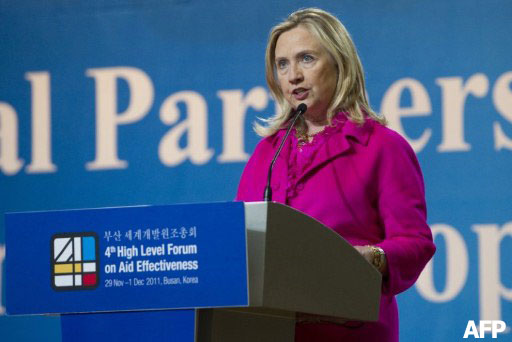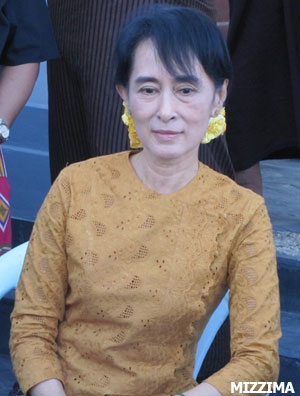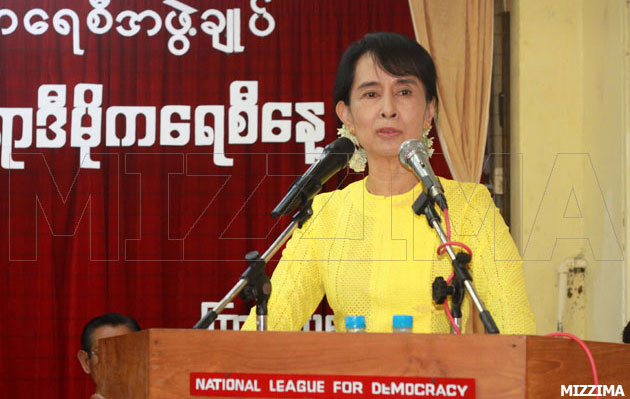Hillary Clinton is the first secretary of state to visit Burma since 1955
Burmese President Thein Sein has hailed a "new chapter" in relations with the US during talks with Hillary Clinton in the capital, Nay Pyi Taw.
Mrs Clinton, the most senior American to visit the country in half a century, told the president she was "encouraged" by recent policy changes.The US maintains tight sanctions on senior figures in Burma's hierarchy.
But a series of reforms this year has led to speculation that decades of isolation could be about to end.
However, US officials have stressed that there is unlikely to be any major announcements on sanctions during Mrs Clinton's trip.
Analysts say the US is more likely to consider symbolic gestures such as upgrading its mission in Burma to a full embassy.
Mrs Clinton's talks with Burma's leadership got under way on Thursday when she met Foreign Minister Wunna Maung Lwin before the talks with President Thein Sein.
"I am here today because President Obama and myself are encouraged by the steps that you and your government have taken to provide for your people," Mrs Clinton told Thein Sein as the two sat down for talks.
Thein Sein said her visit would prove to be a "milestone".
"Your excellency's visit will be historic and a new chapter in relations," he said before the start of the closed-door meeting.
BBC state department correspondent Kim Ghattas, travelling with Mrs Clinton, says the top US diplomat's visit is both a reward for the reforms that have already taken place and an incentive for Burma's government to do more.
The US secretary of state said before the trip she was quite hopeful that "flickers of progress" could transform into a real movement for change.
'No resistance' Mrs Clinton is the first secretary of state to visit Burma since 1955.
The country was taken over by the military in 1962 and ruled by a brutal and unpredictable junta until last year, when the army ceded power to a nominally civilian government.
REFORM IN BURMA
- 7 Nov 2010: First polls in 20 years
- 13 Nov: Aung San Suu Kyi freed from house arrest
- 30 Mar 2011: Transfer of power to new government complete
- 14 Aug: Aung San Suu Kyi allowed to leave Rangoon on political visit
- 19 Aug: Aung San Suu Kyi meets Burmese President Thein Sein
- 6 Oct: Human rights commission established
- 12 Oct: More than 200 political prisoners freed
- 13 Oct: New labour laws allowing unions passed
- 17 Nov: Burma granted Asean chair in 2014
- 18 Nov: NLD says it is rejoining political process
Although the government is still dominated by figures from the previous military regime, it has introduced several important reforms, and released groups of political prisoners.
The visit comes weeks after President Barack Obama toured Asia and made a series of announcements bolstering American commitments in the region.Observers have portrayed the new US focus on Asia as an attempt to counter China's attempts to become the pre-eminent power in the area.
And Chinese state media has reacted furiously to Mrs Clinton's visit to Burma.
The Global Times, which often runs bombastic nationalistic editorials, warned the US not to impinge on China's interests.
"China has no resistance toward Myanmar [Burma] seeking improved relationship with the West, but it will not accept this while seeing its interests stamped on," said a comment piece in the paper.
China has invested heavily in Burma, particularly in the energy sector.
But big Chinese-funded projects such as a hydroelectric dam in the north have provoked resentment among Burmese and led to an upsurge in fighting between ethnic rebels and the army.
Mrs Clinton landed in the remote capital, Nay Pyi Taw, on Wednesday afternoon. After her meeting with Thein Sein, she is due to head to the main city Rangoon to meet pro-democracy leader Aung San Suu Kyi.
Ms Suu Kyi's National League for Democracy recently re-registered as a political party, and she is expected to stand for parliament in forthcoming by-elections.
The NLD had operated outside the political system for two decades, and Ms Suu Kyi spent much of that time in detention. She was freed shortly after the current government came to power.











